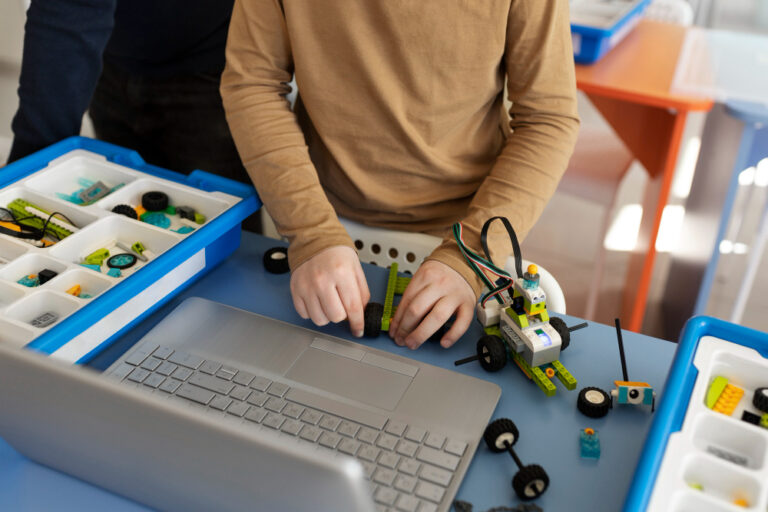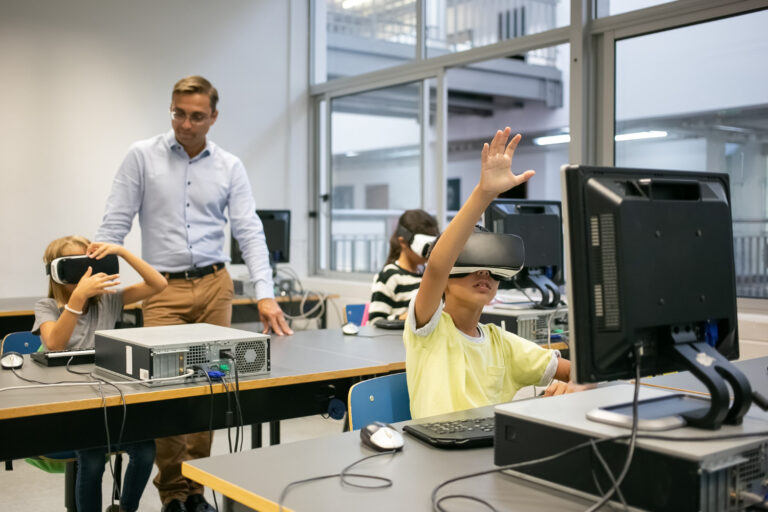The introduction of STEM (Science, Technology, Engineering, and Mathematics) games represents a dynamic and innovative approach to education and learning. STEM games attach the engaging and interactive nature of gaming to impart knowledge and skills in the fields of STEM. STEM games create an environment where users can actively participate in problem-solving, critical thinking, and hands-on exploration of STEM principles.
This interactive learning approach not only enhances understanding but also brings curiosity and passion for STEM subjects. STEM games can have an extreme impact on shaping individuals’ career choices by influencing their interests, skills, and perceptions related to STEM.
Growing Interest in STEM education and careers
The growing interest in STEM education and careers can be attributed to several factors:
Educational Initiatives
Various educational initiatives and outreach programs aim to spark interest in STEM from an early age. Hands-on activities, STEM camps, and mentorship programs help to engage students and showcase the real-world applications of STEM concepts.
Innovation and Creativity
STEM education fosters innovation and creativity. Students in STEM fields are encouraged to think critically, solve problems, and develop innovative solutions. This mindset is valued not only in STEM careers but also in various other industries.
Technological Advancements
The rapid pace of technological advancements has increased the demand for individuals with STEM skills. Emerging fields such as artificial intelligence, machine learning, and biotechnology require a strong foundation in STEM disciplines.
Role of STEM games in shaping career choice
STEM games play a significant role in shaping career choices by providing engaging and interactive experiences that foster interest and skill development in these fields. Here are several ways in which STEM games contribute to shaping career choices:
- Early exposure to STEM subjects is critical for students. Not only does it build a foundation for essential workforce skills in an ever-growing field, but it also boosts student achievement and test scores. Because of this, teachers and parents must focus on familiarizing their students with STEM concepts in preschool and early elementary school to foster future success.
- Hands-on STEM programs and activities teach more than science and mathematics concepts. Many STEM games offer hands-on learning experiences, allowing players to experiment, solve problems, and apply theoretical knowledge in a practical context. This hands-on approach can make STEM subjects more accessible and enjoyable, encouraging players to explore related career paths.
- STEM games promote the development of critical skills such as problem-solving, logical reasoning, creativity, and collaboration. These skills are not only valuable in STEM careers but are also transferable to various other professions.
- Some STEM games simulate real-world scenarios and professions. By allowing players to step into the shoes of scientists, engineers, or mathematicians, these games provide a glimpse into the day-to-day activities of professionals in STEM fields, helping players make more informed career decisions.
Development of interest and curiosity at a young age
Developing interest and curiosity in STEM (Science, Technology, Engineering, and Mathematics) from a young age is crucial for nurturing a future generation of innovators and problem solvers. Here are some strategies to foster interest and curiosity in STEM among young learners:
Hands-on Activities
Introduce hands-on, interactive activities that allow children to explore and experiment. This could include simple science experiments, building projects, or coding exercises. Use age-appropriate kits and materials to make learning tangible and engaging. Children can be introduced to STEM through hands-on activities such as STEM-related hobbies and extracurricular activities. Today robotics clubs, coding workshops, science fairs, and math competitions are increasingly becoming popular and are a great place for children to develop an interest in STEM.
Enjoyable learning fosters interest in STEM subjects
Student’ strongly positive STEM interests and identity predict their future study and career choices in a STEM field. Integrated STEM programs provide a solution to the challenge of instilling students with an interest in the STEM field. However, STEM education studies addressing multiple disciplines are insufficient, as they have produced mixed findings and inadequate direction for advancing integrated STEM education. STEM education not only cultivates critical thinking and problem-solving skills but also opens doors to exciting career opportunities. Encouraging children to embrace challenges and develop solutions independently is a way to develop problem-solving skills.
Positive impact on educational choices
Positive effects on educational choices can have a profound impact on individuals and society as a whole. Access to accurate and comprehensive information about various educational paths, careers, and opportunities enables individuals to make informed decisions about their education. Effective career counseling and guidance help students understand their strengths, interests, and aptitudes, leading to better alignment between their educational choices and future career paths. Positive and supportive environments, both at home and in educational institutions, play a crucial role in encouraging individuals to pursue their educational goals.
Conclusion
This study finds that STEM media have a significant effect in fostering STEM career interest, with most of the effect coming from STEM TV, STEM video viewing, and STEM video games. STEM undergraduates consider many viewpoints and experiences, which are sink in intrapersonal and career outcomes while making career decisions.






